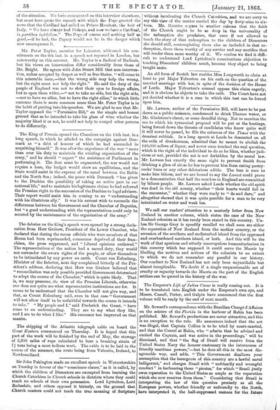The debates on the King's speech were opened by a
strong decla- ration from Herr Grabow, President of the Lower Chamber, who declared that during the recess officials who were members of that House had been reprimanded, communes deprived of their fran- chises, the press suppressed, and "Liberal opinions outlawed." The representatives of the nation had a sacred duty, they would not surrender the sworn rights of the people, or allow themselves to be intimidated by any power on earth. Count von Eulenberg, Minister of the Interior, next day complained bitterly of the Pre- sident's address, declaring that Herr von Grabow believed that "reconciliation was only possible provided Government determined to adopt the course of the Chamber," which is quite likely. That is, we may presume, the view of the Prussian Liberals, otherwise one does not quite see what representative institutions are for. It seems to be understood that the Chamber will not give way, and that, as Count Eulenberg said, even in that case "Government will not allow itself to be unfaithful towards the course it intends to take." "My people and I," said Frederick the Great, "have come to an understanding. They are to say what they like, and I am to do what I like." His successor has improved on that maxim






























 Previous page
Previous page